

Greenhouse gas emissions report (2022)
Editis is a publishing company, based in France. Our group signed the SDG Global Compact in 2012.
The greenhouse gas emissions report is based on 2022 activities in order to build a consistent reduction plan
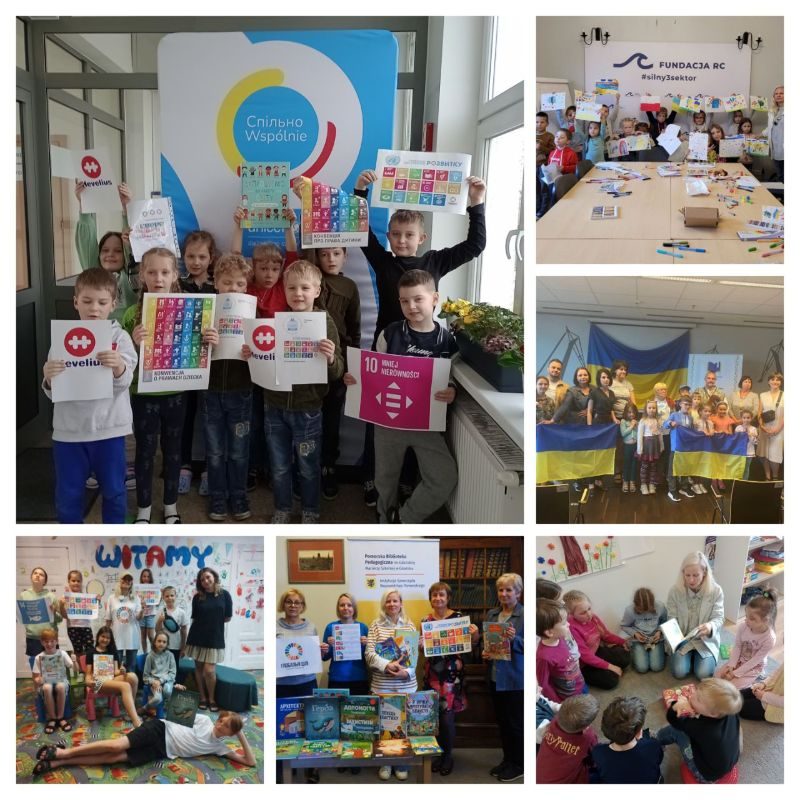
Sustainable Development Goals Book Club for Children of Ukraine
The “Sustainable Development Goals Book Club for Children of Ukraine” project is a public initiative of Olena Ivanchenko as part of the UN SDG Book Club project in cooperation with Ranok publishing house and CF Ranok-Ukraine which aims to regularly acquaint children with books in their native language on the topics of the 17 Global Goals.
It aims to help libraries and communities create their own SDG Book Clubs with support from SDG-implementing organizations in Ukraine.

Sustainable publishing knowledge platform
In response to the growing number of sustainability initiatives in the publishing world, GAU and MEVW have created the online knowledge platform as a central hub for publishers to access valuable information. The platform offers resources on sustainable products, such as different types of paper and cover materials, as well as information on emerging laws and regulations related to sustainability. The goal of the platform is to support publishers in their transition towards a sustainable future.

BIC Environmental Accreditation and Standards Map
In pursuit of a more sustainable future, industries are increasingly seeking ways to incorporate environmental and social responsibility into their operations. The book industry is no exception, and the BIC Environmental Accreditation Badges and Standards Map aims to make progress in this area. Developed as part of the BIC Green Supply Chain Committee, this project offers a comprehensive overview of sustainability accreditation badges and standards relevant to the book industry supply chain.
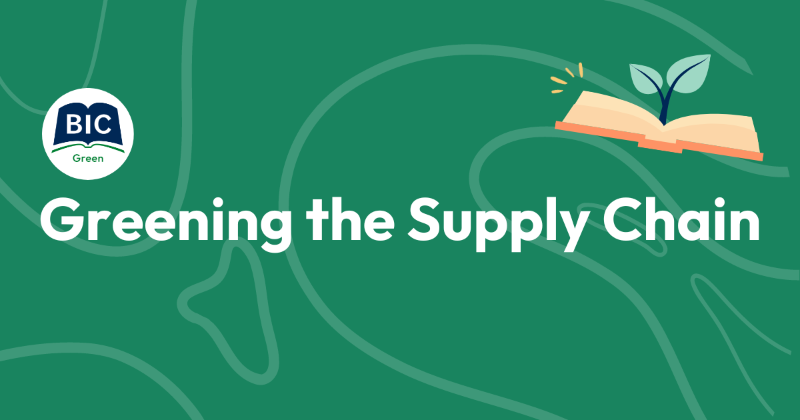
Designed for Recycling Project Part 1 – Life Cycle Assessment
The purpose of this project was to assess the recycling and waste programs that are used in the UK book industry and report on the materials being disposed of vs recycled, the carbon footprint impact of books etc. The project report will help identify the points in the UK book industry supply chain lifecycle
where recycling/waste occurs and list the materials involved at these stages.

RISE Industry Insights Returns
Launched at London Book Fair in 2023, the RISE bookselling have produced a publishing sector study that features seven case studies of how book returns work in European and international countries. The study seeks to understand the returns systems and how this impacts the environment.
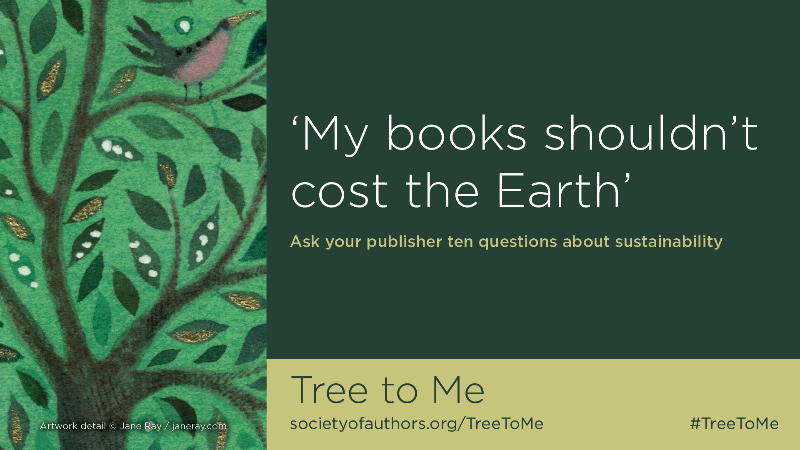
Tree To Me
An awareness raising campaign that helps authors discuss the sustainability of their books with publishers, with the help of ten questions about their book’s production and supply chain. A key aim is to drive traffic towards Publishing Declares, which is prominently signposted.
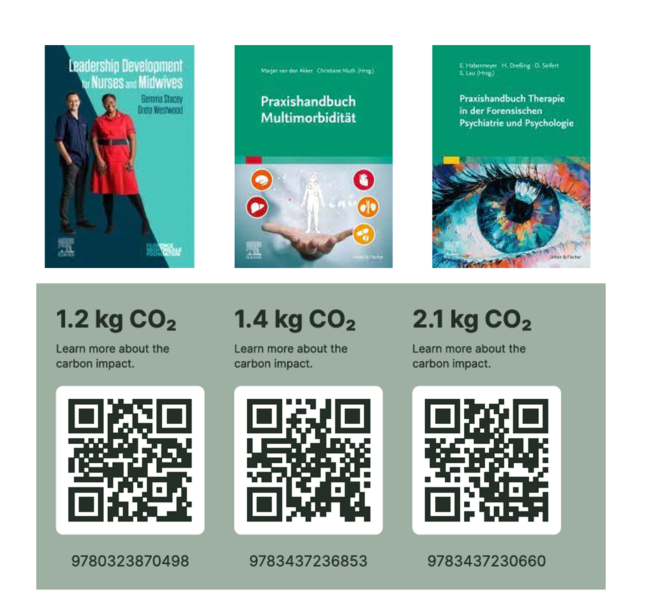
Carbon Label Prototype
The carbon-label project, the first output from the Publishing 2030 Accelerator, fast-tracked established carbon calculators and combined this with a customized web page for a particular book, that gives users a glimpse into how carbon labels and reporting might look like for book production. Now, this is only a prototype. Far more work is needed to make this a reality, and the Accelerator group are now working on new pilots for 2023.

Carbon Calculator
The Publishers Association (UK) has launched its bespoke Carbon Calculator, part of a suite of tools, designed to support its members in acting on the Publishing Declares pledge. The tool will allow members to monitor their carbon outputs across various aspects of their business, including different sites. Members will be able to use the Carbon Calculator to review how they are performing from a sustainability perspective. Over time, with further data, publishers will be able to be benchmark
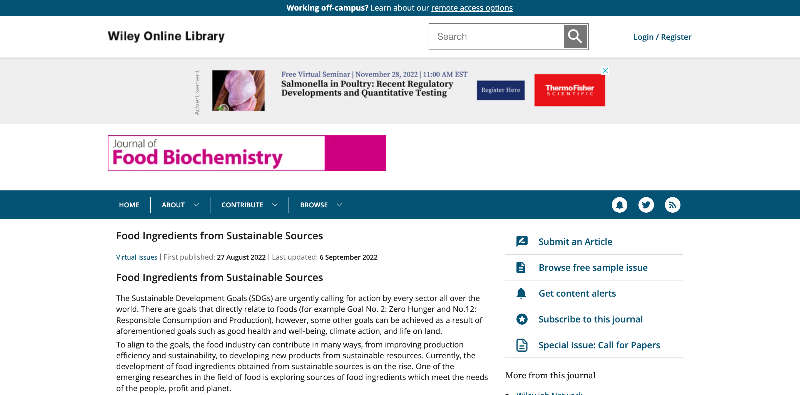
Virtual Issue published in the Journal of Food Biochemistry on Food Ingredients from Sustainable Sources
This virtual issue focuses on food ingredients (peptide, protein, carbohydrate, fat, oil, phenolic, flavor, pigment, etc.) obtained from sustainable sources including food waste, single cell source, plant-based materials, and other related sources.

Environmental sustainability and scientific publishing: a manifesto
The Manifesto was officially published in full in the EASE journal, European Science Editing, in October 2021. It includes a quick check table for editors, publishers, or any interested individuals, to assess their activities and identify possible changes to their daily practices which would lead to more sustainable habits. The Manifesto is a work in progress, with new initiatives being added in regular reviews, including examples of good practice from EASE members.
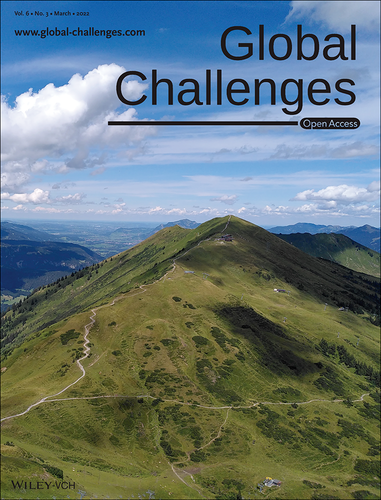
Global Challenges
Global Challenges is an open access peer-reviewed research journal committed to supporting the UN Sustainable Development Goals via the publication of high-quality studies relating to the most pressing societal challenges, including climate change, water and food safety, energy generation and distribution, global health, and sustainability. The journal aims at linking scientific research to social issues and economic policy.
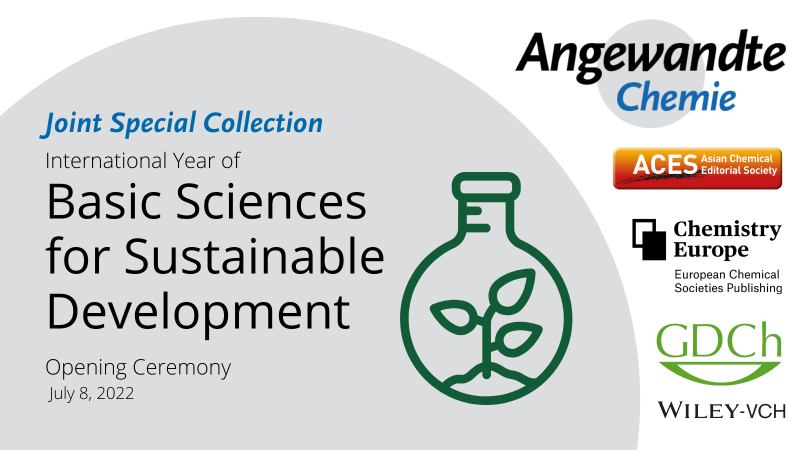
Special Collection in honor of the International Year of Basic Sciences for Sustainable Development
To celebrate the International Year of Basic Sciences for Sustainable Development, Angewandte Chemie along with our sister journals from Chemistry Europe and the Asian Chemical Editorial Society, have come together to create a Special Collection of articles highlighting some of the recent work from our authors toward creating a more sustainable future.
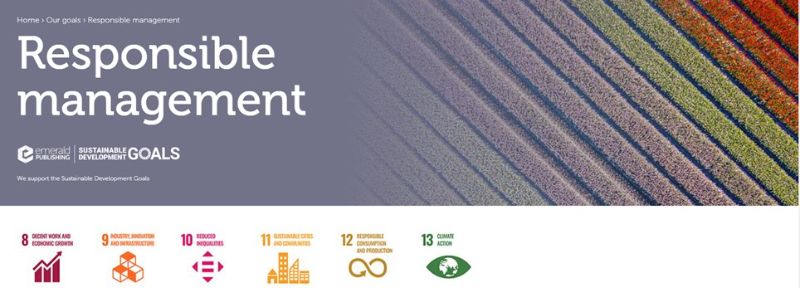
Responsible Management
Responsible Management is one of Emerald’s 4 goals areas designed to promote research leading to a more ethical, responsible, and sustainable ways of working. Our commitment to the SDGs is showcased via our theme-based missions focussing on key interdisciplinary topics for decent work for all. We use a broad array of outputs to reach a wider audience beyond academia and are committed to make research open to all as illustrated by our innovative Open Research platform with its 6 gateways.

PRISME (book packages bundling platform)
The French Book Chain uses a single logistics platform called Prisme where all the packages of books to be delivered to bookstores out of Paris, Belgium and in Luxembourg are gathered and sorted out. This allows bundling the flows of books to bookstores as well as returns, as therefore lowering shipping fees and contributing to a cleaner environment. It is currently used by 350 publishers/ distributors and 2500 booskellers.

Book Chain Project
The Book Chain Project, since 2016 has aimed to build better supply chains for books and help publishers make informed buying decisions. The Component Chemical Screening program, for instance, enables print suppliers to submit exact chemical breakdowns of each book component that can then be screened and flagged to publishers in order to substitute any components of concern.
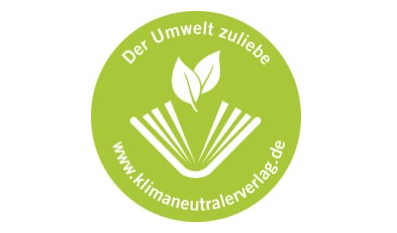
Climate Neutral Publisher Logo (klimaneutralerverlag.de)
The Holtzbrinck Publishing Group, including publishing houses Droemer Knaur, Kiepenheuer & Witsch, Rowohlt, S. Fisher and Argon, announced in the beginning of March 2020 that they are labelling their new books with a new green logo on climate neutrality, referring to the klimaneutralerverlag.de (climatneutralpubliser), and committing to climate neutral production and transparency in climate communication.

The GHG Protocol Corporate Accounting and Reporting Standard
Different organizations and publishers have adopted the GHG protocol standard as a way of allowing them to understand, calculate, and track their carbon footprint. This standard has three phases in which organisations can commit to tracking and reporting on carbon emissions. Hachette Livre, Macmillan, Penguin Random House, Otava Publishing Company and Bertelsmann have set targets for reducing their carbon emissions and switching their operations to rely on green energy.

Frankfurt Book Fair 2020 – Special Edition
In 2020, due to the travel restrictions imposed by the COVID-19 pandemic, the world’s largest book fair took place in a hybrid format. Though the book fair’s traditional on-site exhibition was cancelled, an extensive digital programme for publishing professionals was available, as well as exciting online events for international readers. Thus people could still experience the international exchange the book fair normally provides, even with the challenges posed by the pandemic.
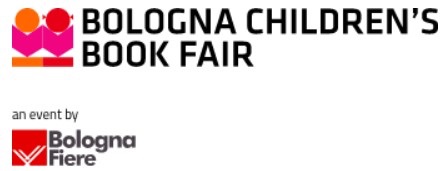
Special Online Virtual Bologna Children’s Book Fair 2020
Due to the travel restrictions imposed by COVID-19 pandemic, the 57th Bologna Children’s Book Fair became a special online virtual event attended by 60,000 visitors (75 percent of non-Italians) with over 400,000 pageviews. The online platform also enabled business to continue with 500 publishers registered on the Global Rights Exchange platform. The success of this virtual event means that the implemented platforms will now become one of the fair’s permanent assets.
